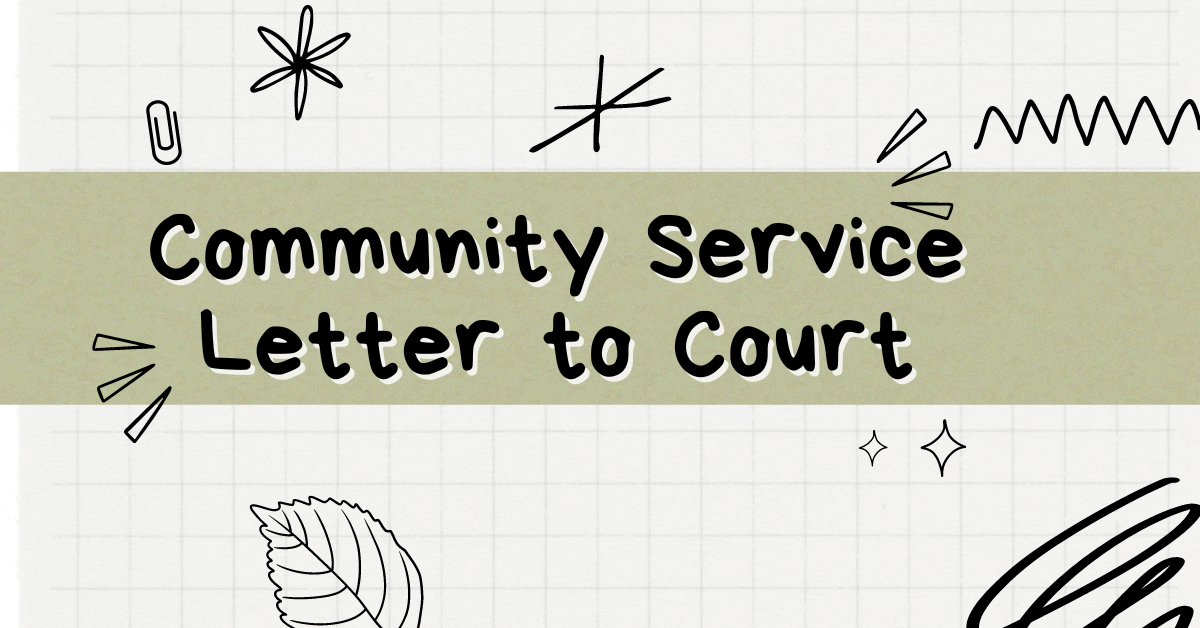In the realm of legal proceedings, a community service letter to court holds a significant role as a written testament to an individual’s commitment to giving back to their community. This letter serves as evidence, often required by the court, showcasing the completion of community service hours as part of a legal requirement or sentence. It outlines the specific tasks undertaken, contributing to a comprehensive overview of one’s civic contributions.
In this article, we aim to simplify the process of drafting a community service letter to court. Recognizing the challenges individuals may face in articulating their experiences, we offer a collection of templates, examples, and samples. Our goal is to provide users with a valuable resource, making it easier for them to craft a letter that effectively communicates their community service endeavors. By sharing these practical tools, we aspire to empower individuals to fulfill this aspect of their legal responsibilities with clarity and confidence.

Sample of Community Service Letter to Court
[Your Name]
[Your Address]
[City, State, ZIP Code]
[Email Address]
[Phone Number]
[Date]
[Judge’s Full Name]
[Judge’s Title]
[Court’s Name]
[Court’s Address]
[City, State, ZIP Code]
Subject: Community Service Completion Letter
Dear Judge [Judge’s Last Name],
I trust this letter finds you in good health and high spirits. My purpose in writing to you is to formally document and communicate the successful completion of the community service hours required as part of my legal obligations.
I am pleased to report that I have fulfilled the court-mandated community service requirements by dedicating my time and efforts to [Name of the Community Service Organization]. Over the course of [number of hours completed] hours, I actively participated in [brief description of the tasks or projects undertaken], contributing to the betterment of our local community.
The experience has been both humbling and enlightening, allowing me to appreciate the value of service and the positive impact it can have on those in need. I am grateful for the opportunity to give back and am committed to continuing my involvement in community service beyond the mandated hours.
Enclosed with this letter, please find [any required documentation, such as a log sheet or a letter from the community service organization] verifying my completion of the required hours. I hope this serves as a comprehensive record of my dedication to fulfilling the court’s directives.
Thank you for your understanding and consideration in this matter. I remain committed to adhering to all legal requirements and appreciate the guidance of the court throughout this process.
Sincerely,
[Your Full Name]
How to Write a Community Service Letter to Court

1. Understanding the Purpose of a Community Service Letter to Court
When composing a community service letter to court, clarity on its purpose is paramount. Learn about the legal context, the specific requirements set by the court, and the significance of the letter in showcasing your commitment to fulfilling obligations.
2. Gathering Essential Information and Documentation
Efficiently compile all necessary details, including the court’s directives, the organization where you performed community service, the number of hours completed, and any supporting documents. Ensuring accuracy and completeness is crucial for a compelling letter.
3. Crafting a Convincing Introduction
Start your letter with a concise introduction that captures attention. Clearly state your intent, express gratitude for the opportunity to complete community service, and set the tone for a positive and cooperative communication with the court.
4. Detailing Your Community Service Experience
Elaborate on your community service involvement. Provide specifics on the tasks performed, skills acquired, and the impact your contribution had on the community. Utilize vivid language to paint a picture of your dedication and the valuable outcomes achieved.
5. Demonstrating Personal Growth and Reflection
Show the court that your community service experience was not just an obligation but a catalyst for personal development. Reflect on how the experience influenced your perspectives, values, and commitment to continued community engagement.
6. Addressing Challenges and Lessons Learned
If faced with challenges during your community service, address them transparently. Highlight how you overcame obstacles, emphasizing the resilience and adaptability demonstrated. Discuss the lessons learned and their contribution to your personal and professional growth.
7. Concluding Professionally and Expressing Future Commitment
Wrap up your letter by summarizing key points, expressing gratitude for the court’s understanding, and outlining your future commitment to community service. End on a positive note, showcasing your eagerness to contribute positively to society.
By following these comprehensive steps, you can compose a compelling community service letter to court that not only meets legal requirements but also portrays your genuine dedication to making a positive impact.
FAQs about a Community Service Letter to Court
In the realm of community service and legal proceedings, individuals often encounter queries about crafting impactful letters for court. Below, I’ve addressed the top five frequently asked questions on the topic.
1. What is the purpose of a community service letter to court?
A community service letter to court serves as a testament to an individual’s fulfillment of court-mandated service. It details the nature and extent of community engagement, acting as a crucial document in legal contexts.
Answer: The primary purpose is to provide the court with a comprehensive overview of your community service experience, including tasks undertaken, skills acquired, and the positive impact on the community.
2. What information should be included in a community service letter?
Ensuring the inclusion of vital details is pivotal. The letter should encompass specifics such as court directives, organization details, hours completed, and any relevant supporting documents to validate the service.
Answer: Include comprehensive information about the court’s requirements, the organization where service was performed, the number of hours completed, and any documents supporting your claims.
3. How can one make a community service letter compelling and persuasive?
Crafting an impactful letter involves more than just relaying facts. It requires vividly describing the community service experience, emphasizing personal growth, and illustrating the positive outcomes achieved.
Answer: Make the letter compelling by narrating your community service journey vividly, emphasizing personal development, and highlighting the positive impact on the community.
4. Should challenges during community service be mentioned in the letter?
Facing challenges during community service is common. Transparency is key. Address challenges candidly, showcasing resilience, adaptability, and the valuable lessons learned from overcoming obstacles.
Answer: Yes, challenges should be addressed transparently, highlighting how you overcame them and emphasizing the lessons learned that contributed to your personal growth.
5. Is there a recommended structure for a community service letter to court?
Organizing the content systematically is crucial. A well-structured letter includes a clear introduction, details of community service, personal reflections, addressing challenges, and a positive conclusion expressing future commitment.
Answer: Yes, a recommended structure involves introducing the purpose, detailing service, reflecting on personal growth, addressing challenges, and concluding with a positive commitment to future community engagement.
These answers aim to provide clarity on common queries related to crafting impactful community service letters for court proceedings.
RELATED:
